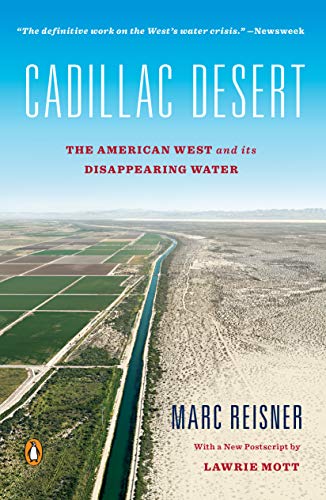Try Blinkist to get the key ideas from 7,500+ bestselling nonfiction titles and podcasts. Listen or read in just 15 minutes.
Start your free trial
Blink 3 of 8 - The 5 AM Club
by Robin Sharma

Cadillac Desert by Marc Reisner is a captivating exploration of the history and politics of water management in the American West. It delves into the complex and often controversial efforts to control and distribute water in this arid region.
In Cadillac Desert, Marc Reisner takes us on a journey through the history of water management in the American West. He begins by painting a picture of the early settlers who were lured by the promise of a fertile land, only to find themselves in a harsh, arid environment. The settlers' solution was to divert water from rivers and streams to irrigate their crops, setting the stage for a relentless quest for water resources.
Reisner then delves into the story of Los Angeles, a city that grew exponentially due to its ability to secure water from the Owens Valley, a region 200 miles to the north. The city's ruthless tactics, including subterfuge and outright theft, to secure water rights are detailed, highlighting the lengths to which people would go for this precious resource.
Reisner then introduces us to two government agencies, the Bureau of Reclamation and the U.S. Army Corps of Engineers, both of which played pivotal roles in transforming the West. The Bureau of Reclamation, established in 1902, was tasked with developing water resources in the arid West, primarily for irrigation. The Army Corps of Engineers, on the other hand, was responsible for flood control and navigation projects.
These agencies, Reisner argues, were instrumental in the transformation of the West's landscape. They built massive dams and irrigation projects, turning deserts into farmland and providing water and electricity to burgeoning cities. However, their projects were not without controversy, as they often came at great environmental and social costs.
Reisner dedicates a significant portion of Cadillac Desert to exploring the environmental and social impacts of these water projects. He describes how the construction of dams and reservoirs disrupted natural ecosystems, leading to the decline of native fish species and the destruction of riparian habitats. He also highlights the social consequences, such as the displacement of Native American tribes and the loss of traditional ways of life.
Furthermore, Reisner argues that the water projects were often economically unsustainable, with the costs far outweighing the benefits. He points to the example of the Central Valley Project in California, which, despite massive federal subsidies, failed to deliver on its promises of prosperity for small farmers.
As Cadillac Desert draws to a close, Reisner presents a sobering assessment of the West's water situation. He argues that the region's apparent water abundance is, in fact, a mirage, created by massive engineering projects that are neither economically nor environmentally sustainable. He warns that the West's water resources are finite and that continued overuse and mismanagement could lead to a catastrophic water crisis.
In conclusion, Cadillac Desert is a powerful critique of the West's approach to water management. Reisner's meticulously researched and passionately argued narrative serves as a cautionary tale, urging us to rethink our relationship with water and to develop more sustainable and equitable water policies.



Cadillac Desert is a thought-provoking book by Marc Reisner that delves into the complex history of water management in the American West. Through extensive research and captivating storytelling, the author uncovers the political, environmental, and social consequences of water development projects, revealing the unsustainable practices that have shaped the region. A must-read for anyone interested in the intersection of water, power, and the environment.
Cadillac Desert (1986) is a captivating account of the history and consequences of water resource management in the American West. Here's why this book is definitely worth reading:
It's highly addictive to get core insights on personally relevant topics without repetition or triviality. Added to that the apps ability to suggest kindred interests opens up a foundation of knowledge.
Great app. Good selection of book summaries you can read or listen to while commuting. Instead of scrolling through your social media news feed, this is a much better way to spend your spare time in my opinion.
Life changing. The concept of being able to grasp a book's main point in such a short time truly opens multiple opportunities to grow every area of your life at a faster rate.
Great app. Addicting. Perfect for wait times, morning coffee, evening before bed. Extremely well written, thorough, easy to use.
Try Blinkist to get the key ideas from 7,500+ bestselling nonfiction titles and podcasts. Listen or read in just 15 minutes.
Start your free trial
Blink 3 of 8 - The 5 AM Club
by Robin Sharma
What is the main message of Cadillac Desert?
The main message of Cadillac Desert is the destructive pursuit of water in the American West.
How long does it take to read Cadillac Desert?
The reading time for Cadillac Desert varies depending on the reader, but it typically takes several hours. The Blinkist summary can be read in just 15 minutes.
Is Cadillac Desert a good book? Is it worth reading?
Cadillac Desert is a compelling and eye-opening book worth reading. It exposes the environmental and political consequences of water development in the American West.
Who is the author of Cadillac Desert?
The author of Cadillac Desert is Marc Reisner.